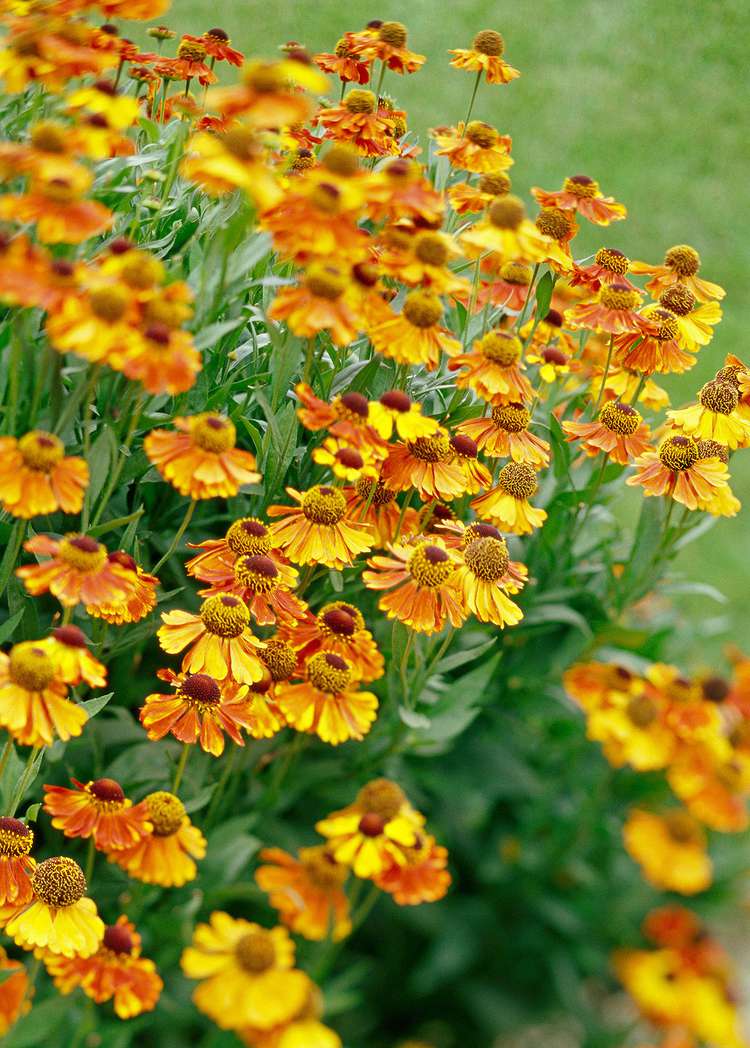8 Fall-Blooming Native Plants to Add Late-Season Color to Your Garden

Native across much of North America, these perennials (and one shrub) bloom late in the season and often keep going until frost. Plant them throughout your landscape to extend the floral show, as well as provide food for many pollinators that are still out foraging until winter begins.
New England Aster
New England aster bears tons of pink, blue, purple, or white flowers that are gorgeous in a vase or in the garden. Butterflies and many other pollinators flock to these flowers.
Name: Symphyotrichum novae-angliae
Growing Conditions: Full sun and well-drained soil
Size: To 6 feet tall
Zones: 4-8
Buy It: Grape Crush New England Aster ($18, Breck's)
Goldenrod
Fall wouldn't be nearly as cheery without the yellow flowers of goldenrod brightening up the landscape. And despite the common misconception, goldenrod is not a source of seasonal allergies (ragweed, which blooms at the same time, is the real culprit).
Name: Solidago rugosa
Growing Conditions: Full sun and well-drained soil
Size: To 4 feet tall
Zones: 4-9
Buy It: Goldenrod Wildflower Seeds (from $6, Etsy)
Perennial Sunflower
While most gardeners are familiar with the big-blooming annual sunflowers, perennial species are every bit as beautiful. 'Lemon Queen', for example, produces gorgeous creamy-yellow blooms in late summer and early fall.
Name: Helianthus maximiliani
Growing Conditions: Full sun and well-drained soil
Size: To 8 feet tall
Zones: 4-9
Buy It: Giant Maximillian Sunflower Seeds ($8, Etsy)
Helenium
Part of a big group of native plants in the daisy family, helenium offers cheery yellow, orange, or red blooms at the end of the season. And despite its common name of sneezeweed, it won't aggravate your allergies. It is so named because the flowers were made into snuff in the past, used to induce sneezing to clear out congestion.
Name: Helenium autumnale
Growing Conditions: Full sun and well-drained soil
Size: To 5 feet tall
Zones: 3-8
Buy It: Red Jewel Helenium ($28, Breck's)
Turtlehead
A fun plant with a fun name, turtlehead earned its moniker because of the shape of its purplish-pink blooms. Clusters of these unique flowers appear around August and keep going until freezing weather sets in. This perennial likes damp soil, so it makes a good choice near water gardens or in bog gardens.
Name: Chelone lyonii
Growing Conditions: Part shade and consistently moist soil
Size: To 3 feet tall
Zones: 4-9
Buy It: Chelone lyonii Tiny Tortuga/Turtlehead ($13, Etsy)
Mexican Bush Sage
Dozens of plants in the sage family are native to North America, and Mexican bush sage is one of the showier ones you can grow. It has downy white stems, gray-green willowy leaves, and spikes of pinkish purple flowers that attract hummingbirds. It's perennial in the warmer regions of the U.S. but can be grown as an annual in colder areas where it isn't hardy.
Name: Salvia leucantha
Growing Conditions: Full sun and well-drained soil
Size: To 4 feet tall
Zones: 8-10
Anise Hyssop
This tough, drought-tolerant perennial looks beautiful for months in summer and fall. That's when anise hyssop is covered with spikes of lavender-blue, licorice-scented flowers that pollinators love. It's also known as hummingbird mint because this mint family relative draws plenty of these winged visitors.
Name: Agastache foeniculum
Growing Conditions: Full sun and well-drained soil
Size: To 5 feet tall
Zones: 4-9
Buy It: Blue Fortune Anise Hyssop ($25, Breck's)
Witch Hazel
Common witch hazel contributes color late in the season with both its spidery yellow, fragrant flowers and golden-yellow fall foliage. It's especially great for brightening up a shady garden when most other plants are winding down for winter.
Name: Hamamelis virginiana
Growing Conditions: Full sun to part shade and moist soil
Size: To 12 feet tall and wide
Zones: 3-8